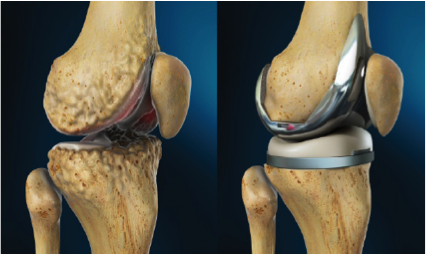Total Knee Replacement.
What is a Total Knee Replacement (TKR)?
A Total Knee Replacement or sometimes called Total Knee Arthroplasty is where your knee joint gets replaced with an artificial alternative. In some cases, they may just replace 1 surface of the knee joint (hemi), either the femoral side (above knee) or the tibial side (below knee). Often, they will do both. In some cases, they may also replace your Patella (kneecap).
Why would I need a TKR?
There are a few different indications for a TKR, the most common one being osteoarthritis that is significantly limiting function and or causing disabling pain. In most cases conservative management is trialled first with a TKR being the last case scenario. Other indications may include fractures or other bone disorders such as avascular necrosis (death of bone tissue from lack of blood supply) or tumours.
What can I expect after a TKR?
After your surgery it is common for the operated joint to be painful, swollen and difficult to move. Depending on your procedure it is common to remain in hospital any where between 3 and 7 days. You will be seen by hospital Physiotherapists who will work with you up to twice daily to reduce risk of complications and commence gentle knee range and strengthening exercises around your hip and knee. You will likely be assisted to weight bear using a frame day 1. Prior to discharge from hospital the aim is to have 90 degrees knee flexion (knee bend). Once discharged from hospital you will attend outpatient Physiotherapy sessions to educate, progress your exercises, restore strength around both your hip and knee and improve your walking and function. It is quite normal for pain, stiffness and some oedema (swelling) to be present up to 6 months following your surgery.
Is there anything I shouldn’t do after my TKR?
There are no formal precautions following a Total Knee Replacement however, this will depend on the orthopaedic surgeon and surgical procedure performed.
The following are a few things that should be limited immediately after your surgery …
Sleeping/resting/sitting with a pillow under knee for a prolonged time. This may result in the knee being unable to achieve full extension (being straight).
Prolonged immobility/bed rest. This may result in the knee feeling stiffer and sorer when you try to move it.
Can the team at Goolwa Physio Help?
Our staff at Goolwa Physio can assist you to move better and restore muscle strength in your legs. Physiotherapy treatment will likely involve education and a guided exercise therapy program aimed at restoring full range of motion, strength around knee and hip and achieve personal goals.
At Goolwa Physio we recognise that having surgery is a big deal and we can help you get better as soon as possible so book a consult today.



